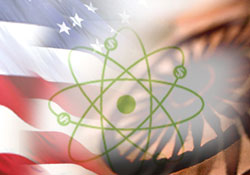Only 123 Pact will determine the US-India nuke deal: Richard Boucher
New Delhi, Mar. 5:  U. S. Assistant Secretary of State for Central and South Asian Affairs, Richard Boucher, today reiterated that the 123 agreement between Washington and New Delhi would determine the future of the US-India civil nuclear deal and not the Hyde Act.
U. S. Assistant Secretary of State for Central and South Asian Affairs, Richard Boucher, today reiterated that the 123 agreement between Washington and New Delhi would determine the future of the US-India civil nuclear deal and not the Hyde Act.
Addressing a news conference in the Indian capital, Boucher described the Hyde Act as a domestic legislation that would enable the 123 Agreement and would in no way impinge on the US-India civilian nuclear deal.
He said both the Hyde Act and the 123 Pact were consistent and were aimed at allaying the fears of Indian lawmakers that the Hyde Act would definitely hurt Indian interests as far as the nuclear deal was concerned.
The Hyde Act will not be contradicting the 123 Agreement, rather it will facilitate the arrangement between the two nations, Boucher added.
"As far as the Hyde Act goes, it is important to remember that Hyde Act is domestic U. S. legislation. The Hyde Act determines to some extent what we can do in our government. It doesn't……….. its main function is really to allow this kind of cooperation, so, that way, the Hyde Act is the enabling legislation that lets us go out and conclude an agreement with India and …so, the fundamental principle of Hyde Act is to allow us as a government to go out and conclude that arrangement we have done with India and finalize….that's how we are operating, that how we American diplomats are operating. The agreement between United States and India is the 123 ….that's something what binds India .. or what puts the US and India within the same framework and that agreement is something we both intend to carry out fully in accordance with its own terms. But I don't see a contradiction between the two," said Boucher.
Reminding India about the 'tight deadlines' regarding the civil nuclear deal, Boucher said that the US is waiting to hear from his Indian counterparts on the nuclear deal issue.
He urged his Indian counterparts to 'put all the pieces of the puzzle together.
He also expressed optimism about India's stand and said that the deal would be a 'good agreement' for Indo-US non-proliferation.
A non-binding resolution was introduced in the U. S. House of Representatives last year that has been raising questions on whether the proposed U. S.-India civil nuclear agreement complies with U. S. law.
According to the US, while the resolution has no legal effect, it reflects misgivings among some lawmakers about the deal, which would give India access to U. S. nuclear fuel and equipment for the first time in 30 years even though New Delhi has tested nuclear weapons and has refused to join non-proliferation agreements.
The deal is controversial in India, where the Communist allies of the government led by the Congress Party oppose it. The two sides agreed to form a panel to study the deal, which the Left believes compromises India's sovereignty.
One point of contention is the Hyde Act requirement that the United States cut off nuclear exports to India if it tests another nuclear weapon. The U. S.-India agreement does not make that explicit, but rather gives either side the right to end the pact for any reason with one year's notice. (ANI)